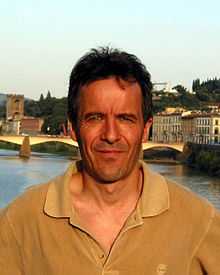Bernard Chazelle
| Bernard Chazelle | |
|---|---|
 | |
| Born |
Bernard Chazelle[1] November 5, 1955 France |
| Alma mater | Yale University |
| Occupation | Computer scientist |
| Spouse(s) | Celia (Martin) Chazelle |
| Children |
Damien Chazelle Anna Chazelle |
Bernard Chazelle (born November 5, 1955) is the Eugene Higgins Professor of Computer Science at Princeton University. Much of his work is in computational geometry, where he has found many of the best-known algorithms, such as linear-time triangulation[2] of a simple polygon, as well as major complexity results, such as lower bound techniques based on discrepancy theory.[3] He is also known for his invention of the soft heap data structure and the most asymptotically efficient known algorithm for finding minimum spanning trees.[4]
Life
Chazelle grew up in Paris, France, where he received his bachelors degree and masters degree in applied mathematics at the Ecole des Mines de Paris in 1977. Then, at the age of 21, he came to Yale University in the United States, where he received his Ph.D. in computer science in 1980 under the supervision of David P. Dobkin. He went on to claim important research positions at institutions such as Carnegie Mellon, Brown, NEC, Xerox PARC, the Institute for Advanced Study, and the Paris institutions École Normale Supérieure, École Polytechnique, INRIA, and Collège de France. He is a fellow of the ACM, the American Academy of Arts and Sciences, the John Simon Guggenheim Memorial Foundation, and NEC, as well as a member of the European Academy of Sciences.
Chazelle has also written essays about music and politics.[5] He is the father of director Damien Chazelle.
Works
- The Discrepancy Method: Randomness and Complexity. Cambridge University Press. 2000. ISBN 978-0-521-00357-5.
References
- ↑ http://www.cs.princeton.edu/~chazelle/
- ↑ Chazelle, Bernard (1991), "Triangulating a Simple Polygon in Linear Time", Discrete & Computational Geometry 6: 485–524, doi:10.1007/BF02574703, ISSN 0179-5376
- ↑ Chazelle, Bernard (2000), The Discrepancy Method: Randomness and Complexity, Cambridge University Press, ISBN 978-0-521-00357-5
- ↑ Chazelle, Bernard (2000), "A minimum spanning tree algorithm with inverse-Ackermann type complexity", Journal of the Association for Computing Machinery 47 (6): 1028–1047, doi:10.1145/355541.355562, MR 1866456.
- ↑ http://www.cs.princeton.edu/~chazelle/
External links
|
| |
|
|
|